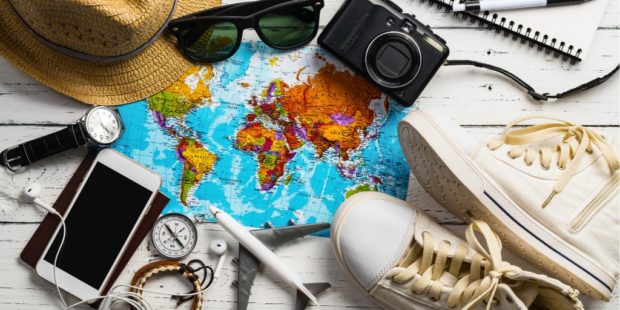It’s that time of the year when things start to wind down, and we begin to look forward to our end-of-year plans that range from catching up with friends, reuniting with relatives, and most importantly – our travel plans.
With the year that we’ve had, a lot of us are looking forward to jetting off to our vacation spots and unwinding. In fact, in addition to helping to relieve us of the year-long stress, traveling also boasts other health benefits. Believe it or not, packing your bags and heading off to new locations can strengthen your immune system, reduce the risk of heart disease and even boost your creativity.
Unfortunately, while our vacation time is supposed to be relaxing, some people may find themselves battling with travel anxiety, thus making their holidays an additional source of stress. What’s more, the situation is heightened if you are already part of the 450 million people that suffer from a mental health disorder worldwide.
A holiday, while welcomed, can disrupt one’s routine, triggering unwanted symptoms and leaving one’s mental health and emotions in disarray. That said, there are a few ways in which to prevent this and ensure that one stays both happy and healthy during your travels.
8 Top Travel Tips For A Stress-Free Trip
1. Plan accordingly
If you have a layover or a couple of hours before check-in or after check-out at your Airbnb or hotel, consider using luggage storage. If you want to ensure a stress-free trip, then the most important thing is to make sure that you prepare well in advance. From booking left luggage London services for baggage handling to planning your itinerary, your preparations should include everything.
The best way to do this would be by compiling a list of your travel necessities and crossing each item off the closer your trip approaches. This list should include your passport, visa as well as any other necessary documentation that includes flight tickets, vaccinations, and information about the places you are visiting – especially if you are liable to experience a serious culture shock. Don’t forget to check if the countries you’ll be visiting require an international driving license, and make sure to obtain one in advance to avoid any last-minute complications during your journey. Furthermore, ensure you have translations of your vaccination records, alongside other essential documents, as part of your travel preparations, to ensure a smooth and hassle-free experience as your departure date nears. Additionally, it would be advisable to book both your flights and hotel rooms in advance and online as this will help to reduce travel anxiety.
Also, if you have been diagnosed with a mental health disorder, and you have been prescribed medication to help manage the disorder, it’s advisable that you make sure to pack enough medication for the duration of your trip. What’s more, some medications that are prescribed to help manage mental health conditions are considered controlled substances in some countries. As a result, it’s advisable to consult your doctor for more information. Once you’ve arrived at your destination, make sure to keep your medication in a safe place, preferably in a carry-on.
2. Make plans to keep in touch
Now while a vacation is an opportunity to escape from the familiar, the sudden change may trigger unexpected stress. Because of that, it would be advisable to make plans to be able to check in with people back home. You’d be surprised how a simple phone conversation with a familiar voice can help to boost your mood.

Moreover, your family and friends aren’t the only ones you should make plans to stay in contact with whilst traveling. If you have concerns about how your mental health will cope on your trip, you should also make plans with your mental-health-care provider and schedule a check-in call – even if it’s good news.
3. Stay active on your vacation
Yes, you are on holiday, but that doesn’t mean that you should suddenly adopt a sedentary lifestyle. In fact, exercise can provide just as many benefits for your mental health as it does for your body.
According to research findings published in The Lancet Psychiatry journal, an active lifestyle can result in fewer days of poor mental health. This may be rooted in the fact that exercise helps to relieve stress and improve mood in individuals dealing with depression, anxiety, and other mental health issues. For instance, you’re traveling with your pet to Dallas for a few days but want to stay active, despite being in an urban environment? Then you find a stay at one of Dallas dog friendly hotels and go to the Spring Creek Forest Preserve Trail, one of the best hiking spots nestled between office developments and crowded streets.
Now you may not be able to get your full Bikram yoga routine, but that doesn’t mean that you shouldn’t find ways to stay active. Simply grab a pair of running shoes and jog around the area where you’re staying or make sure to pack a skipping rope or resistance band in your suitcase and spend 30 minutes every morning with each tool. Additionally, you can opt for the stairs instead of the elevator or even sign up for a walking tour of the museum. Heck if you have a chair in your hotel room, you can work out with that too. To make it more convenient for you, though, you may want to book a private villa or rental home equipped with a gym or fitness equipment.
4. Eat healthily
Now while you’re on holiday, you are definitely going to be tempted to try the local cuisine. Now there are no issues with this, but you just need to make sure that your vacation diet primarily consists of healthy foods that will benefit both your physical and mental health.
A study published in the journal PLOS ONE found a strong link between mental health and dietary choices. The study, published earlier this year in October, found that symptoms of depression significantly dropped in a group of young adults after they began to follow a more Mediterranean-style pattern of eating. What’s more, the depression score amongst the control group – who continue to eat a diet rich in processed foods and refined carbohydrates as well as sugary foods and beverages – remained high.
That said, while enjoying the local cuisine, be sure that your diet is low in alcohol and sugar but high in fruits, vegetables, whole grains as well as water.
5. Stay on top of your money
Financial concerns are one of the most prominent sources of stress, and this is still true while you’re on holiday. Unfortunately, you may find yourself worrying about how much your trip is costing you and if you’ll return home to a big bill.
![time [longevity live]](https://longevitylive.com/wp-content/uploads/2019/10/beach-holiday-leisure-1770310-620x827.jpg) That said, it’s important to create a holiday budget and do your best to stick to it during your travels. Additionally, you can also withdraw cash so that you don’t go around using, or rather over-using, your credit card.
That said, it’s important to create a holiday budget and do your best to stick to it during your travels. Additionally, you can also withdraw cash so that you don’t go around using, or rather over-using, your credit card.
Lastly, in regards to your holiday budget, be sure to put aside enough money for an emergency flight back just in case you need to leave your holiday destination as soon as possible.
6. Get enough sleep
Our sleep schedule is definitely one of the few things that get disrupted once we go on vacation. This is likely because we now have the chance to either sleep in or stay up all night wandering a new city. That said, it’s important to remember that, regardless of changing time zones, a healthy sleep schedule is the one thing you’ll want to maintain while on holiday, especially if you want to protect your mental health.
According to a study conducted by sleep researchers at the Sleep and Circadian Neuroscience Institute at the University of Oxford in the United Kingdom, lack of sleep can increase the risk of mental health problems, and it is a driving factor in the occurrence of paranoia as well as other hallucinatory experiences.
That said, regardless of where you are, try to do your best to get at least 7 hours of sleep every night.
7. Adopt stress-relieving habits
In addition to the aforementioned tips, you can also adopt stress-relieving techniques that you know will help to relieve your mood while on holiday.
These techniques include meditation, journaling, clutching stress balls, practicing mindfulness, or even listening to your favorite song. All of these habits have been proven to help to reduce stress and effectively lighten your mood (1,2).
8. Spoil yourself
You are on vacation after all, and by treating yourself, you’ll be surprised at the effect on your mental health. Travel is meant to be an enjoyable experience. Therefore, you should try to find ways in which to make the experience even more pleasant. If you are traveling to Florida, then booking yourself one of the Key West Fishing Charters is the way to go. Definitely something unique to spend time on!
For instance, you could treat yourself to a spa day. Now, this doesn’t have to involve full treatment, as you may be on a budget. That said, you can sign up for some form of a back massage or foot rub. You could also sit down to enjoy a five-course meal at a restaurant in town.
Traveling is a great experience and a wonderful experience that we should all do our best to engage with. Now while it does come with its stressors, it should be noted that maintaining mental health while you travel isn’t difficult, but it just takes proper planning and prioritization.
Happy travels!
References
Chekroud, S., Gueorguieva, R., = Zheutlin, A., et al. (2018). Association between physical exercise and mental health in 1·2 million individuals in the USA between 2011 and 2015: a cross-sectional study. The Lancet Psychiatry. 5. https://DOI:10.1016/S2215-0366(18)30227-X.
Francis HM, Stevenson RJ, Chambers JR, et al. (2019) A brief diet intervention can reduce symptoms of depression in young adults – A randomised controlled trial. PLOS ONE 14(10): e0222768. https://doi.org/10.1371/journal.pone.0222768
Frédéric C. G., William W. M., Andrew V. S., and Adam D. G., (2015). Fashion with a Foreign Flair: Professional Experiences Abroad Facilitate the Creative Innovations of Organizations. AMJ, 58, 195–220, https://doi.org/10.5465/amj.2012.0575
Mahmood, S. S., Levy, D., Vasan, R. S., & Wang, T. J. (2014). The Framingham Heart Study and the epidemiology of cardiovascular disease: a historical perspective. Lancet (London, England), 383(9921), 999–1008. https://doi:10.1016/S0140-6736(13)61752-3
https://www.who.int/whr/2001/media_centre/press_release/en/
https://www.apa.org/news/press/releases/stress/2017/state-nation.pdf
https://wellcome.ac.uk/press-release/treating-insomnia-may-reduce-mental-health-problems



![women [longevity live]](https://longevitylive.com/wp-content/uploads/2020/01/photo-of-women-walking-down-the-street-1116984-100x100.jpg)










